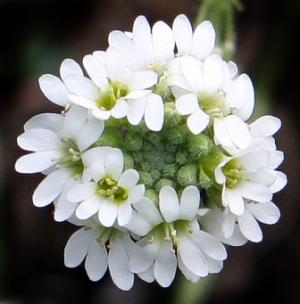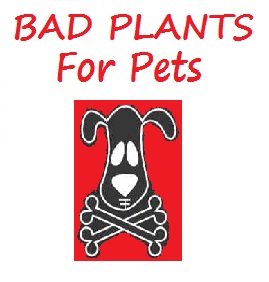Hoary Alyssum

Berteroa incana (Hoary Alyssum) is an erect, densely haired annual, biennial or short-lived perennial growing to 3 feet in height. A member of the mustard family it grows from a deep taproot. The foliage is rough with star shaped hairs. The leaves are simple alternate and narrow, longer than they are wide. . The flowers are white, numerous and arranged into racemes, though they appear to be clustered at the ends of the stems. The flowers have four petals that are deeply notched. The (fruit) seedpods are round and slightly flat, each containing several seeds.
The exact toxin the plant possesses is as of yet unknown and its effects seem to be not only species dependent but vary from one animal to the next within the same species. No cases of hoary alyssum toxicity in ruminants (dairy, beef, sheep or goats) have been reported to date. Some horses, however, have shown a response to hoary alyssum while others have not. According to the University of Minnesota “in field cases where a large number of horses were known to be involved, only approximately 50% of the animals ingesting hay containing 30 to 70% hoary alyssum demonstrated any of the clinical signs of toxicity. The cases of severe "stocking up," apparent founder, and death have only been observed in horses ingesting hay containing 30 to 70% hoary alyssum. Only mild "stocking up" has been observed in horses on pasture or those ingesting hay with low percentages of alyssum.” and “In very rare cases, where hoary alyssum comprised extremely high percentages of the hay (30 to 70%), only circumstantial evidence exists associating the plant with the death of a few horses. To date, death has not occurred in horses fed hay containing hoary alyssum under experimental conditions.”
In horse cases involving mild to moderate intoxication the most common symptoms are depression and swelling of the lower legs (stocking up), 12 to 24 hours following ingestion. Short term diarrhea and fever has also been noted as a common symptom. In severely poisoned animals symptoms were considerably worse and included all of the above in addition to acute and severe gastrointestinal toxicity accompanied by intravascular hemolysis, hypovolemic shock, and death secondary to endotoxemia. In pregnant animals premature parturition or abortion has also occurred.
Another potential danger posed by this plant in addition to the actual chemicals the plant produces is the fact that these plants readily absorb, accumulate, and store environmental toxins, such as pesticides and nitrates. Toxins which are then passed onto the animal that chooses to ingest the plant. The overall threat to livestock posed by these plants is low, as most animals find them to be relatively unpalatable. As a result they will typically ignore them unless other food sources are limited. Due to the weedy nature many plants of this genus possess they can, however, infest pastures, choking out other non toxic plants; essentially forcing themselves on grazing animals and thus becoming the bulk of their diet. Poisonings occur most commonly as the result of contaminated hay.
Avoid further ingestion of the plant and consult a veterinarian. Life threatening intoxication is rare, fatalities, while possible are rarer yet. Due to the limited amount that animals are likely to consume, serious intoxication is rare and in most cases symptoms will be mild and subside 2 to 4 days following removal of the alyssum source. In regards to a specific treatment regimen, in most cases involving a limited ingestion symptomatic treatment for laminitis and possibly preventative treatment for shock will likely be all that is required. The majority of horses that receive treatment for mild intoxication will recover.
In cases of severe intoxication treatment may be considerably more involved up to and including blood transfusions, and other life saving measures. The prognosis for severely intoxicated animals will likely be grave.




